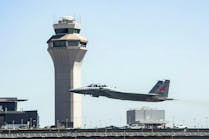KYIV, Ukraine — Russia's military said Wednesday that it was continuing the withdrawal of troops and materiel, a move meant to telegraph an easing of its standoff with Washington and NATO over a possible invasion of Ukraine.
But the transatlantic alliance remains skeptical of Moscow's claims, saying it had not yet "seen any de-escalation on the ground."
The Russian Defense Ministry released a video depicting a nighttime scene of a train pulling flatbed carriages loaded with armored vehicles as it crossed a bridge in Crimea to "the point of permanent deployment," meaning their regular base. Russia seized the Crimean peninsula from Ukraine in 2014.
Wednesday's claimed pullback continues a drawdown of troops that Moscow says began a day earlier, which it characterized as a routine return to base following the conclusion of military exercises. Over the last few weeks, Russia has assembled a large-scale force comprising more than 150,000 troops, along with armored vehicles, helicopters, fighter jets, battleships and submarines, near Ukraine's borders, almost encircling the former Soviet republic in what many feared was a prelude to a full-on blitz into the country.
But Russian President Vladimir Putin, in discussions with German Chancellor Olaf Scholz on Tuesday, said he intended to rely on diplomacy to get Russia's security demands met, which include a ban on allowing Ukraine to enter NATO, a pullback of missiles from sensitive areas near Russia and a rollback of NATO infrastructure to 1997 levels.
Despite Putin's words, Western and NATO officials remain wary, especially since the Russian defense ministry's Wednesday announcement — like its previous one a day earlier — provided no details on the number of troops withdrawn.
"On the contrary, it appears that Russia continues the military buildup," NATO Secretary-General Jens Stoltenberg told reporters ahead of a meeting with NATO defense ministers in Brussels on Wednesday.
Stoltenberg noted that Russia's massing of troops and equipment near Ukraine in the past had seen soldiers pulled back but equipment remaining in place.
"They have always moved forces back and forth. So just that we see movement of forces ... doesn't confirm a real withdrawal," he said, adding that Russia retains the capability of a full-fledged invasion of Ukraine without any warning. "What we need to see is a real withdrawal of forces, which is lasting and real."
Although Russian military exercises in Crimea have apparently concluded, other drills held near Ukraine's border with Belarus were ongoing. Belarus, a top Russian ally, is hosting more than 30,000 Russian troops on its territory as part of those drills, dubbed Allied Resolve 2022. But Belarusian Foreign Minister Vladimir Makei said those troops would also head home once the drills end Sunday.
"Not a single [Russian] soldier or a single unit of military equipment will stay on the territory of Belarus after the drills with Russia," Makei told reporters, adding that Ukrainian officials had been reassured that "what is happening on the border does not mean that someone is planning to carry out an act of aggression."
In recent days, Western sources had raised the alarm that an invasion was set to begin Wednesday. In Ukraine, President Volodomyr Zelensky proclaimed Wednesday a new national holiday, Unity Day.
On Wednesday morning, crowds assembled under overcast skies in Kyiv's Olympic National Sports Complex stadium and unfurled an almost 200-yard-long Ukrainian flag. Buildings in other cities were also draped with the yellow-and-blue national flag, and Zelensky was scheduled to make an appearance later in the day in the eastern port city of Mariupol.
With hostilities failing to materialize early Wednesday, Russian officials began a series of mocking broadsides.
"I'd like to request U.S. and British disinformation ... to publish the schedule for our upcoming invasions for the year," Russian Foreign Ministry spokeswoman Maria Zakharova wrote on her official channel on the messaging app Telegram. "I'd like to plan my vacation."
Similarly, when asked about a possible attack on Ukraine, Russia's ambassador to the European Union, Vladimir Chizhov, said there would be no escalation.
"Wars in Europe rarely start on Wednesday," he said.
___
©2022 Los Angeles Times. Visit at latimes.com. Distributed by Tribune Content Agency, LLC.


